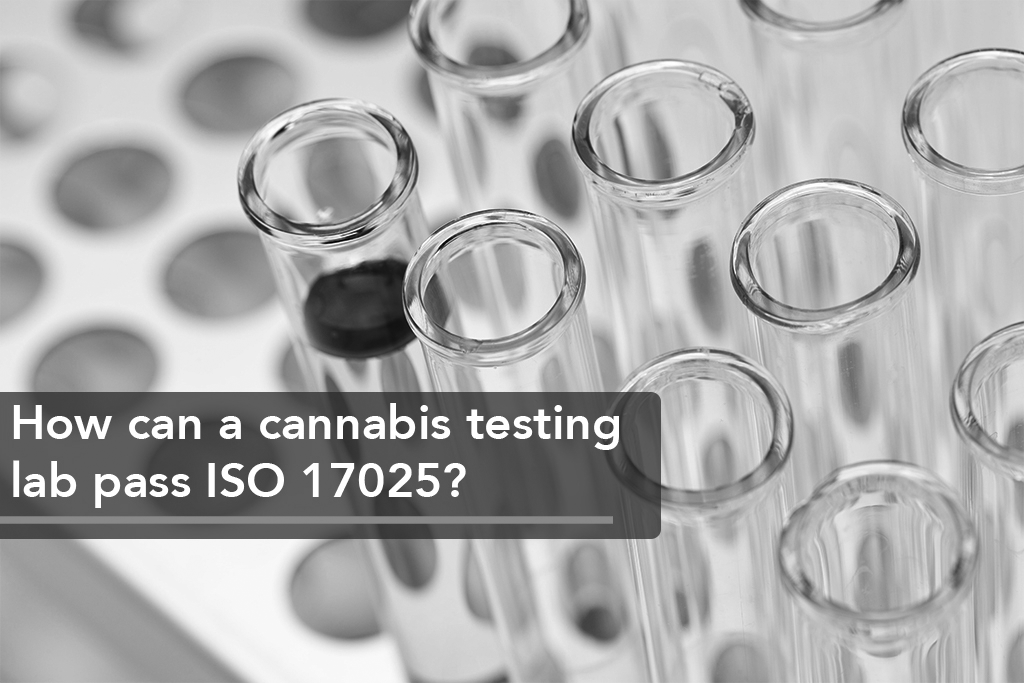
How can a cannabis testing lab pass ISO 17025?
July 31st, 2020 ByAt a Federal level in the United States cannabis is illegal. Some states, however, have made the decision to legalize it. This means that cannabis is not FDA regulated but instead falls under the jurisdiction of the state itself. In an attempt to standardize the production and testing of cannabis, 26 states require testing for medical or adult-use cannabis, such as Ohio, of which 18 require accreditation and third-party audit such as the IEC/ ISO 17025:2017.
Whether it’s a legal requirement or not, a third-party audit provides organizations with an opportunity to demonstrate the quality of their testing facilities, as well as a competitive advantage. Before we take a closer look at how to attain the accreditation, let’s understand why it’s so important, and how the audit process is carried out.
Why is attaining an accreditation for cannabis testing facilities important?
Cannabis is a consumable product, and just as with any other consumable product such as fruits and vegetables, it can contain contaminants, pesticides and fungi. Ensuring that laboratories are accredited minimizes the risk of cannabis products entering the market with these harmful substances. This, therefore, protects public health and demonstrates that the facilities have been testing in the correct manner, and to an international standard.
Who needs to get accredited?
Requirements for testing ultimately depend on the state in which the laboratory operates. It is, however, recommended that all laboratories obtain the accreditation to demonstrate their high quality operating procedures to stakeholders, employees, clients, and competitors. ISO 17025 is now required regardless of the number of employees working at the laboratory since the 2017 revision.
Please note, ISO standards are revised every couple of years, so make sure that you keep up to date with any changes. You can do so by discussing it with an ISO specialist at IMSM. Get in touch now!
If the accreditation is necessary for cannabis testing laboratories in a particular state, it is also dependent on the testing methods used. In California for example, you must attain the accreditation if you test:
- Cannabinoids
- Terpenoids
- Mycotoxins
- Heavy metals
- Residual pesticides
- Residual solvents
- Microbial impurities
How does an audit work?
A qualified auditor from an accredited body will assess a facility against a specific checklist to determine whether they are compliant. All documents must be ready and prepared for the auditor’s assessment.
How can cannabis testing labs pass the ISO 17025 audit?
Attaining accreditation is not an easy task; it comes with thorough preparation and organization. Here are some of the steps that you can take to help you come closer to passing the ISO 17025 audit.
1. Prepare
How you prepare will ultimately depend on the type of testing that your laboratory undertakes. More basic testing labs, for example, will require less documentation as they are less likely to have a large number of testing methods. Each laboratory, however, should cover the following points:
- Perform a gap analysis against the audit checklist to ensure that all areas are covered, and identify room for improvement. This way the facility can also gain a greater understanding ahead of time of what processes and operations will be covered in the audit.
- Early preparation provides an opportunity to discover any risks to the business and anything that may fail an audit or damage the facility’s reputation, for example, errors in sampling or incorrectly analyzing data. This longer timeframe also allows the ability to rectify these issues.
- Collate all of the required documents, and ensure that they are current. For example all SOPs (standard operating procedures), records of all operations in the facilities, a scope of accreditation, training records, and quality manuals. Again, completing this ahead of time will help you to discover any missing documentation, and sort this, so that you can make the best impression on the auditor!
2. Take a look at your workforce structure
To pass the ISO 17025, it’s extremely important that your staff are working together. Encourage collaboration within the team to create a huge combined effort to gather everything together and ensure a smooth audit process.
It’s also recommended to nominate someone to oversee the auditing process, such as a compliance manager or quality manager. Depending on the size of your organization you can then delegate further tasks down to other management or senior staff.
Ensure that your management staff are up to the task. They have an incredibly important role of overseeing staff training, to ensure that all results pertaining to the laboratory are accurate. They’ll need to ensure that all staff have had the required training and achieved the relevant qualifications. Staff will also be required to discuss certain elements with auditors, so managers will need to make sure that each employee understands and can professionally communicate the necessary information.
3. Ensure that you have a Quality Management System in place
Having a system in place to manage data and laboratory operations is required to maintain the accreditation, as it is a sure way of minimizing the risk of error. A Quality Management System is a great way to store all of this information under one roof. It’s far easier to document and monitor reports, inspections, training on laboratory-specific software, as well as information surrounding samples and test result data. Not only will this make it simpler and quicker to find all of the information during the audit, but also in daily laboratory procedures.
4. Do your own internal audit!
Going through the audit process yourself is a great form of a practice run ready for the third-party auditor so that you can solve any problems before the official audit. What’s more, it’s actually required by the ISO/IEC certification, to prove that standards are being upheld.
The internal assessor can ensure that all the preparations are adequate, and all documentation is in place. An audit also encompasses a tour of the laboratory, so practicing this may also be beneficial to identify any areas of the route that may need to be reorganized, and where may be best to discuss procedures with the auditor.
5. External pre-audit
You could also complete a pre-assessment by an external auditor, as a mock assessment. Not only can you ensure that you tick all the boxes, these auditors typically have a lot of experience and knowledge in the area, and therefore may be able to advise on improving areas that haven’t been picked up in an internal audit. It also provides a more realistic scenario for employees who may have to answer questions from the auditor.
For more information on the ISO 17025:2017 accreditation, and to discuss how you can successfully prepare for your audit and attain the accreditation, get in touch with one of the IMSM team.
Contact Us
For a free Quotation or On-Site presentation by an ISO Specialist, contact us today!
IMSM Inc
1500 District Avenue
Burlington
Massachusetts
MA 01803
USA
